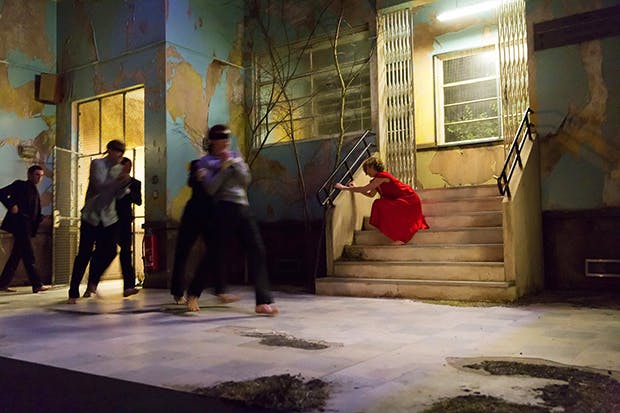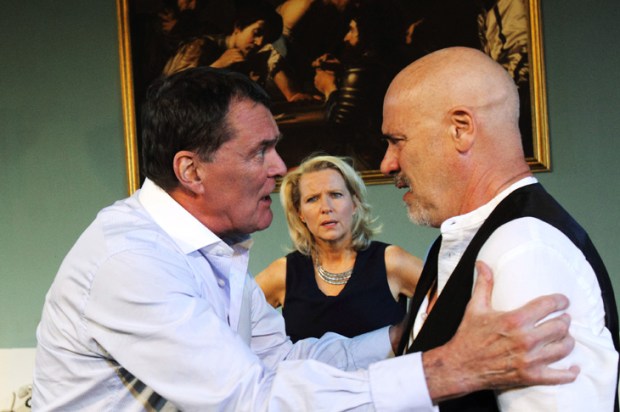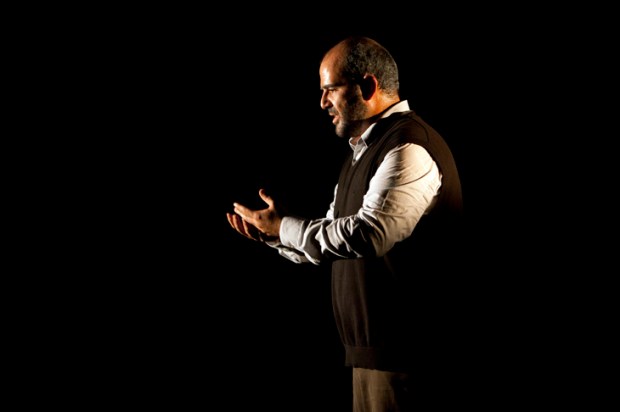Big fuss about Cleansed at the Dorfman. Talk of nauseous punters rushing for the gangways may have perversely delighted the show’s creators but I’m firmly with the exiteers. This is barely a play and more a thin, vicious pantomime with an Isis-video aesthetic. The minuscule plot follows Grace (Michelle Terry) as she visits a prison hospital to receive news of a tortured relative. She’s immediately roped in as a victim and we’re treated to a sequence of gougings, knifings, electrocutions, rectal penetrations and tongue extractions which are bizarrely interspersed with scenes of lustful romance.
Alex Eales’s design stands out. The duck-egg blue paint of the smashed-up hospital peels away to reveal oatmeal plasterwork over a mahogany skirting board, which creates a harmonious ensemble of derelict coloration. But the script is a mass of childish unpleasantness and facile symbolism. A rat gets shot each time the show reaches a new plateau of savagery. Bursting sunflowers herald a spree of dancing and rough sex. The rhythm becomes predictable. Amputations and rapes are followed by disco music and rushed copulations between desperate lovers, who never seem to remove quite enough underwear to make the pelvic joinery credible. Beautiful Michelle Terry has to spend most of the show getting brutalised while stark naked. And just when you thought she’d been stripped and gangbanged enough, she’s prised out of her clothes yet again and trundled off to have a castrated penis sewn on to her genitals whereupon she’s wheeled back in to watch her tormentor-in-chief penetrating a youthful lap dancer whom he then shoots through the skull. Thanks, National Theatre, for that cache of visual delight.
The real difficulty is the emphasis on voyeurism. To watch a creature being smothered is pornographic. To watch the creature’s parents being appraised of the smothering is tragic. And here tragedy is trumped by porn every time. The sadistic obsession with upfront ghastliness dominates everything and rather than harrowing the soul the show merely perturbs the senses. Hence the flouncings-out by miffed play-goers. They weren’t squeamish or oversensitive; they were just dismayed to see surface gore taking priority over the quest for emotional treasure. Poor Sarah Kane. Her greatest skill — acute and witty dialogue — is barely deployed in this nasty and dispiriting pageant. She ended her life shortly after completing the script and it feels like a sad diary scrawl best left to her grieving family.
God’s own county, Yorkshire, has acquired a grim reputation as God’s own grooming parlour. Firebird, by Phil Davies, examines the case of Tia, a perky blonde aged 14, who tips up at a burger joint in a northern town in need of comfort and food. A local Asian, AJ, helps her out with a bag of chips. He’s bright, charming and only slightly creepy in his flash grey suit and his prowler’s stubble. Calling himself a ‘youth worker’ he gives her a cigarette from a silver case and hints that he might be able to launch her as a model. Once she accepts his tawdry bribes, he subtly changes his attitude and implies that she has placed herself in his debt. He offers her a ride in his Mercedes and we all know what happens next.
Jump-cut to a few months later. Tia, by now a fully fledged sex slave, lies alone and half-naked on bloodstained sheets in a locked bedsit. Enter AJ and we learn that Tia has attacked one of her abusers with a broken bottle. AJ claims to be outraged and humiliated by her ‘disloyalty’ but he’s also desperate for her to complete her shift and he starts to bully and cajole her into smartening herself up, drinking a pint of nerve-coddling vodka and servicing a fresh queue of waiting rapists. He succeeds. These two scenes — showing the initial grooming and its vile endgame — are as horrifying and riveting as anything you’ll see on the London stage. The dialogue and the psychological details feel entirely authentic and some in the audience were weeping in shock and revulsion. This stuff happened. Public anger demands a reckoning.
And yet the play feels misshaped and undernourished. Some details are mystifying. The gang’s busiest rapist is a white Yorkshireman called ‘Graham’. The injuries to Tia’s leg aren’t properly explained. A scene in a police station in 2014 shows a boorish detective cross-examining Tia with no one else present. And yet by this date the authorities had begun to treat victims with tact and sympathy. The script is too puny for its subject. The role of Tia’s friend is all but irrelevant and this leaves just two actors, Callie Cooke and Phaldut Sharma, to represent the sprawling retinues of neglected children, rampaging paedophiles, bungling cops and myopic social workers. An honourable first attempt but this story needs weightier resources and a broader canvas.
Got something to add? Join the discussion and comment below.
Get 10 issues for just $10
Subscribe to The Spectator Australia today for the next 10 magazine issues, plus full online access, for just $10.














Comments
Don't miss out
Join the conversation with other Spectator Australia readers. Subscribe to leave a comment.
SUBSCRIBEAlready a subscriber? Log in